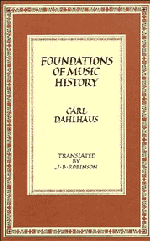Book contents
- Frontmatter
- Contents
- Translator's preface
- Foreword
- 1 Is history on the decline?
- 2 The significance of art: historical or aesthetic?
- 3 What is a fact of music history?
- 4 Does music history have a ‘subject’?
- 5 Historicism and tradition
- 6 Hermeneutics in history
- 7 The value-judgment: object or premise of history?
- 8 The ‘relative autonomy’ of music history
- 9 Thoughts on structural history
- 10 Problems in reception history
- Bibliography
- Index
5 - Historicism and tradition
Published online by Cambridge University Press: 01 June 2011
- Frontmatter
- Contents
- Translator's preface
- Foreword
- 1 Is history on the decline?
- 2 The significance of art: historical or aesthetic?
- 3 What is a fact of music history?
- 4 Does music history have a ‘subject’?
- 5 Historicism and tradition
- 6 Hermeneutics in history
- 7 The value-judgment: object or premise of history?
- 8 The ‘relative autonomy’ of music history
- 9 Thoughts on structural history
- 10 Problems in reception history
- Bibliography
- Index
Summary
Nietzsche once differentiated between antiquarian, monumental and critical histories. In so doing he created a distinction which, albeit with a different emphasis, forms a central issue in the current controversy over historicism: is historiography a means of assimilating the past or of exercising a critique of tradition? In the popular imagination, the historian is an antiquarian piously absorbed in reconstructing fragments of the past out of an instinctive urge to collect and preserve on the one hand and a desire to escape the pressures of the present on the other. Yet this view is thoroughly onesided. The original motivation behind the development of history as a science lay in the urge, not to master tradition, but to subject it to a rigorous critique. Historicism has its roots in the realisation that a gap exists between the aspirations of the present and the imprint left upon the present by the past.
According to Ferdinand Christian Baur, an eccleciastical historian with Hegelian leanings, it was sixteenth-century Protestantism that produced the form of historical awareness known as ‘tradition critique’ by counterposing revelation and tradition:
So little credence does a Catholic attach to historical evolution that he views all that has come about over the ages as having existed since the beginnings of time. […]
- Type
- Chapter
- Information
- Foundations of Music History , pp. 53 - 71Publisher: Cambridge University PressPrint publication year: 1983



